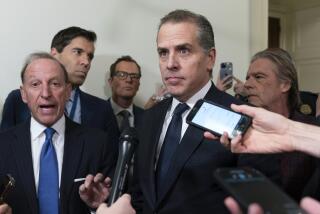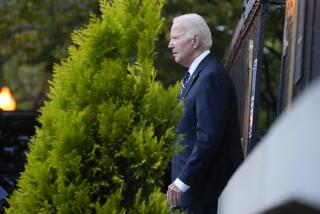Enhanced politics
- Share via
It took a few days, but the Bush administration has realized that Congress has a right to answers -- soon -- about the destruction by the CIA of videotapes showing “enhanced” interrogation of two suspected terrorists, which in this case may be a euphemism for waterboarding.
At his news conference Thursday, President Bush said that internal administration inquiries “coupled with the oversight provided by the Congress will end up enabling us all to find out what exactly happened.” Also on Thursday, the chairman of the House Intelligence Committee said that the CIA had agreed to make at least some documents and witnesses available to the panel.
Contrast such cooperation with the letter last week in which Atty. Gen. Michael B. Mukasey essentially told the chairman and ranking member of the Senate Judiciary Committee to mind their own business while the Justice Department and the CIA inspector general investigated the 2005 incident. Mukasey created a bipartisan backlash when he said he wouldn’t provide the committee with “nonpublic information about pending matters.” He should have realized that the politics that pervaded the Justice Department under his predecessor, Alberto R. Gonzales, made Congress suspicious of purely internal investigations of matters that might embarrass the administration.
Moreover, the destruction of the tapes isn’t just a legal issue; it touches on the continuing controversy in Congress over enhanced interrogation techniques such as waterboarding and sleep deprivation. Earlier this month, a House-Senate conference committee voted to require CIA interrogators to abide by the Army Field Manual, which prohibits enhanced techniques. (That reform could still be blocked in the Senate or by a presidential veto.)
It isn’t only Congress that has forced the administration to rethink its initial rigidity. A federal judge in Washington has scheduled a hearing today at which lawyers for detainees at Guantanamo Bay are expected to argue that the destruction of the tapes violated a court order requiring the preservation of evidence relevant to torture at Guantanamo, even though the CIA’s two captives were questioned elsewhere. The administration is free to try to convince the court that the two issues aren’t related. But it can’t simply ignore a federal judge -- any more than it can Congress.
More to Read
Get the L.A. Times Politics newsletter
Deeply reported insights into legislation, politics and policy from Sacramento, Washington and beyond. In your inbox three times per week.
You may occasionally receive promotional content from the Los Angeles Times.










